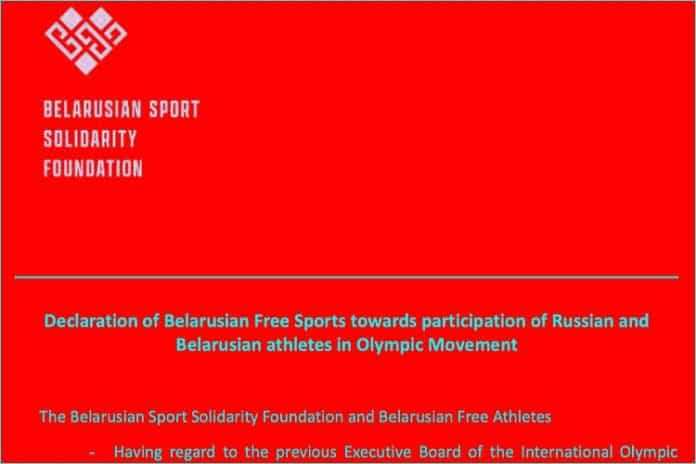★ The Sports Examiner: Chronicling the key competitive, economic and political forces shaping elite sport and the Olympic Movement.★
★ Bravo to our 24 donors, who have now covered 53% of our technical expenses for the first half of 2023. Please consider a donation. Thank you in advance. ★
★ To get The Sports Examiner by e-mail: sign up here! ★
≡ THE 5-RING CIRCUS ≡
1. Brignone wins Worlds Combined as Shiffrin misses late gate
2. Sykes letter to U.S. Olympic community: wait and see on Russia
3. Czechs say no on Russia in Paris; UCI backs IOC 100%
4. Five 1980s U.S. Olympic rowers rip new USRowing gender policy
5. United Kingdom Athletics pushing for “open” category for trans aths
At the FIS Alpine World Championships, Italian star Federica Brignone won the women’s Alpine Combined for her first Worlds gold, as defending champ Mikaela Shiffrin of the U.S. was disqualified three gates from the finish while leading on the clock. A very well-written letter from new U.S. Olympic & Paralympic Committee Chair Gene Sykes sent in late January to athletes, U.S. National Governing Bodies and others explained a wait-and-see attitude on what the International Olympic Committee proposes on possible Russian and Belarusian participation in future international events. The Czech Olympic Committee – and the country’s prime minister – came out against Russian and Belarusian participation, but the UCI, the international federation for cycling, backed the IOC completely (and has allowed Russian and Belarusian riders to continue competing in its events as neutrals). Five former U.S. Olympic rowers denounced the new USRowing gender-identity regulations, effective last December, for adopting “a policy that so blatantly discriminates against female athletes in rowing.” The U.S. federations for rowing and fencing have now issued regulations allowing “say it and play it” gender competition choices. The British track & field federation, UK Athletics, issued its own gender-identity policy, stating that only those who are females at birth should be allowed to compete in the women’s category and that the men’s division should be changed to “open” to accommodate transgender athletes.
● Panorama: U.S. Olympic & Paralympic Committee (change the NCAA) = Fencing (IOC Ethics complaint) = Figure Skating (ISU awards) = Gymnastics (doping) = Judo (IJF awards) = Skateboarding (age 12 medalist!) = Wrestling (Turkish earthquake deaths) ●
1.
Brignone wins Worlds Combined as Shiffrin misses late gate
Plenty of drama on the first day of the FIS Alpine World Championships in France, as Italy’s Federica Brignone won the women’s Alpine Combined in Meribel, but only thanks to a late error from American star Mikaela Shiffrin.
A three-time Olympic medal winner (0-1-2), Brignone was easily the fastest in the Super-G, timing 1:10.28 to lead Lara Gut-Behrami (SUI: 1:10.99), with Shiffrin – the defending champion – in sixth, 0.96 seconds back.
On the Slalom, Brignone skied beautifully at 47.19 and with a total of 1:57.47, was going to be tough to catch. Gut-Behrami opted out of the Slalom and Shiffrin skied hard and actually took the lead on the checkpoints coming toward the finish.
But instead of a seventh career Worlds gold, Shiffrin lost her line three gates from the finish and was disqualified for missing a gate.
Meanwhile, Swiss Wendy Holdener ended with the fastest Slalom time (47.15) and moved from 15th to silver, with Austria’s Ricarda Haaser moving from eighth to bronze with the third-fastest Slalom (48.15). Holdener had won the Worlds Combined in 2017 and 2019, and took her third medal in the event, while Haaser, 29, had never won a World Cup medal in her career, let alone a World Championships medal before!
Brignone, 32, was the Beijing 2022 bronze medalist in the Combined, but took her first Worlds gold in any event and only the second Worlds medal of her career; she won a Giant Slalom silver way back in 2011.
Shiffrin knew she was going to have to take chances on the Slalom:
“The surface changed a little bit on those last gates. On inspection, I saw it was a bit more unstable on the snow and I had to be still strong with my position and the course, it doesn’t go straight to the finish, it keeps turning. I tried to be aware of that but I also knew that if I had a chance to make up nine-tenths on Federica – or more than that – I had to push like crazy. So, I did and I had a very good run.
“I am really happy with my skiing. It’s just at the end, letting it go a little bit too much too soon and then you don’t make it. It’s such short distance between the gates and you can’t make an error like that. Of course, I know that and I did it anyway. I am happy with the run.”
The men’s Combined comes on Tuesday and the event continues through the 19th.
2.
Sykes letter to U.S. Olympic community: wait and see on Russia
A 25 January letter reported on last week from new U.S. Olympic & Paralympic Committee Chair Gene Sykes to the American Olympic community detailed the USOPC’s position on the International Olympic Committee’s continuing examination of the competition situation for Russian and Belarusian athletes.
The text of the letter is now available, and explains with clarity and considerable subtlety the USOPC position: nothing has been decided and let’s see what the IOC comes up with. Sykes’s letter included:
“I hope this note finds you well. And, while January seems to have flown by, it’s never too late to wish you a happy and healthy New Year.
“I felt it necessary to share with you the attached report that was issued today by the IOC Executive Board, and which outlines a summary from several consultation meetings they held last week and provides a statement of solidarity with Ukraine, reaffirms sanctions against Russia and Belarus, and confirms the status of athletes from these countries.
“Sarah Hirshland and I both participated in these sessions to voice our position as the USOPC, and I would like to share that thinking with you.
“We made it clear that our position has not changed. We remain committed to the principles of Olympism that are reflected through the strength of the sanctions that were put in place by the IOC nearly a year ago. We support these sanctions and believe they should continue to be upheld.
“We applauded the support that so many in our community – specifically our NGBs – offered to the Ukrainian Olympic Committee and their athletes. It has been an honor to host athletes and officials at our training centers in the United States, and alongside Team USA athletes, throughout this past year and we are prepared to do more to help them as they prepare for international competition. We are committed to doing our part to ensure that sport can survive and thrive in Ukraine well into the future.
“After listening to many athletes and constituents from around the United States, we recognize a real desire to compete against all the world’s best athletes – but only if that can happen in a way that ensures safe and fair play. And there is very real concern, even skepticism, about whether that condition can be met.
“As such, we encouraged the IOC to continue exploring a process that would preserve the existing sanctions, ensuring only neutral athletes who are clean are welcome to compete. This process will require careful management and will demand extra efforts to earn the confidence and trust of our community.
“If these conditions of neutrality and safe, clean, and fair competition can be met, we believe the spirit of the Olympic and Paralympic Games can prevail. This will continue to be our guiding focus.
“I understand that media coverage stemming from these discussions has been confusing, and transparently – that’s because it is. This is an incredibly complex situation that is constantly evolving, and I encourage you to please reach to me or Sarah with any questions, concerns, or suggestions as we continue to navigate this together.”
Observed: The letter does not, as has been claimed in some reports, that the USOPC subscribes to the notion that Russian and Belarusian athletes should be returned to competition, but is waiting to see what the outcome will be of the IOC’s continuing discussions before making any judgement, or even collecting comments from athletes, coaches and other USOPC stakeholders. And it underscores the continuing concerns – for now forgotten because of the war in Ukraine – over whether the doping culture in Russia, especially, has been curtailed or reversed.
“Skepticism” is the key word, and rightly so. A decision comes later.
3.
Czechs say no on Russia in Paris; UCI backs IOC 100%
The International Olympic Committee’s continuing discussions over Russian and Belarusian athletes at Paris 2024 continues to attract attention from governments, with the Czech Republic being the latest to weigh in. Czech Prime Minister Petr Fiala said Monday:
“I can’t really imagine Russian and Belarusian athletes… competing in Paris at a time when Ukrainian athletes are dying while defending their country. Under these conditions, the participation of Russian athletes in the Olympic Games doesn’t sound like a good idea to me.”
The Czech Olympic Committee issued a statement that included: “Russian and Belarusian athletes cannot compete at the Olympic Games. We can see no reason to change” the current sanctions. The COC, however, does not support a boycott, but noted “We will naturally respect the will of each athlete if they decide not to take part.”
The Union Cycliste Internationale (UCI), however, adopted the IOC’s view en toto, issuing a statement a Friday statement, including agreement to allow “possible participation” by Russian and Belausian athletes:
“who fully respect the Olympic Charter would be able to participate. In other words: firstly, only those who have not gone against the IOC’s mission of peace by actively supporting the war in Ukraine would be able to compete; secondly, only those athletes who fully comply with the World Anti-Doping Code and all relevant anti-doping rules and regulations would be eligible. Verification will be carried out for each athlete entered.”
It should be noted that the UCI currently allows Russian and Belarusian riders to compete – as neutrals – on international cycling teams which are not registered in Russia or Belarus.
In Moscow, Russian Sports Minister Oleg Matytsin told the TASS news agency:
“We believe that Lausanne is beginning to realize that major international competitions cannot be held without the participation of Russian athletes. … We see how governments of some countries today openly declare interference in the decision-making process of international sports federations, try to take them hostage, exposing them to political conditions to boycott the Olympic Games. We are convinced that this directly contradicts the Olympic Charter and is aimed at destabilizing and destroying the Olympic family. History shows that boycotts never achieve their goals, and in the end only end with cruel punishment for athletes of several generations at once.”
In contrast, Russia’s Vancouver 2010 Olympic Cross Country Skiing men’s Sprint silver medalist Alexander Panzhinsky told TASS:
“Unfortunately, the IOC is an event agency that is paid for by sponsors, primarily American ones. Accordingly, whoever pays dictates the rules. As long as there is no alternative to the Olympic Games, we need to participate in them and create an alternative if we don’t want to obey.
“To chop off your shoulder and say that world sport will die without us is wrong, this will not happen, they will live without us. It will be worse for us at times, so we should not refuse the conditions put forward if they do not contradict the moral principles of the athlete. Everyone has to do it for themselves.”
4.
Five 1980s U.S. Olympic rowers rip new USRowing gender policy
/Updated/“USRowing rejected fairness for female rowers of all ages and levels with the release of its updated Gender Identity Policy on December 1. We are a group of former Olympic rowers, and we are enraged that USRowing would adopt a policy that so blatantly discriminates against female athletes in rowing.
“The updated policy permits males, with or without testosterone suppression, to compete in girls’ and women’s events. Only at the collegiate and elite level has USRowing allowed any restrictions. At that level, male rowers competing in the women’s category must comply with World Rowing’s policy, which requires 12 months of continuous testosterone suppression at no greater than 5 nmol/L, twice the high end of the normal range for females.”
That’s the start of an opinion piece posted last Thursday (2nd) on Newsweek.com by five former U.S. Olympic rowers from the 1980 and 1984 teams, decrying the “USRowing Gender Identity Policy” which allows athletes to compete “with their expressed gender identity” via registration with the federation. It also defines competition categories of “men,” “women” and “open” plus a “mixed” definition for Masters events only.
The federation notes specifically:
“This Gender Identity Policy is applicable only to athletes competing in domestic competitions hosted or sanctioned by USRowing. Any athlete competing for placement on an international team organized by USRowing, or athletes representing the United States in an international event, shall follow the rules consistent under the entity running that event, for example, World Rowing, or the International Olympic Committee. It is important to note that those rules may not be consistent with USRowing’s policy.”
World Rowing has much stricter requirements, as the opinion piece notes. The women write caustically of USRowing’s attitude toward science and its tactics in adopting the new policy:
● “Science has unequivocally proven that testosterone suppression—even for years—does not erase the physiologic advantages that males have over females. Every cell has a sex which influences all aspects of the body’s development. It is not biologically possible to change sex at the cellular level, even with hormone therapy. Suppressing testosterone, regardless of the degree, does not remove all the sex-based advantages that males possess, such as greater heart and lung size. Males as a sex are physically bigger, stronger, and faster. While some females can outperform some males, at any matched level many males outperform all females. By permitting males to compete against females, the updated USRowing policy grossly discriminates against its female athletes.”
● “To support its updated policy, USRowing cites concern for the mental health of trans athletes, noting that 45 percent of LGBTQ youth seriously considered suicide in the past year. Certainly, this is a startling statistic and anyone suffering with mental health concerns should receive professional medical attention. However, justifying a position of discrimination against females by using concern for the mental health of another group is an unfair and inappropriate burden for females to carry. In essence, females are told by governing bodies that they must subjugate their rights to support the mental health of others. This is nothing short of emotional blackmail and we have first-hand knowledge that many young females are afraid to speak their minds because of it.”
The solution? The women write:
“Promoting the rights of one group by destroying the rights of another does not represent a just solution. Trans athletes can fairly compete in a male/open category. We expect USRowing to immediately rescind its policy and replace it with one that recognizes the value of female athletes.”
The authors are Dr. Mary O’Connor (1980 team), Carol Brown (1976-80-84), Jan Palchikoff (1976-80), Patricia Spratlen Etem (1980-84) and Valerie McClain (1980-84). Brown won a bronze medal in the women’s Eights in Montreal in 1976; Palchikoff finished fifth in the Double Sculls (corrected: Palchikoff was not on the Eights as previously listed).
USRowing’s 1 December policy change joined USA Fencing’s “say it and play it” approach to gender identity, which it posted on 7 November 2022. As with rowing, the U.S. fencing regulations apply to competitions it sanctions, but unlike rowing, there are no gender identity regulations posted at the International Federation (FIE) level, allowing a man registered as a female to potentially compete in an FIE event!
5.
United Kingdom Athletics pushing for “open” category
for trans athletes
A three-page statement released Friday by the national governing body for track & field in Great Britain – UK Athletics – wants to reserve women’s competition only to those athletes who were registered female at birth:
“In recognition of the available scientific evidence, UKA believes that efforts should be made to:
“a. fairly and safely include transgender women in an “open” category, which would replace the current male category and be open to athletes of all sexes; and
“b. reserve the women’s category for competitors who were female at birth, so that they can continue to compete fairly.”
The federation was specific on the question of hormone suppression for women:
“UKA does not agree with the use of testosterone suppression for transgender women:
“a. Scientific evidence, as detailed in the SCEG Guidance is that transgender women retain a testosterone/puberty advantage over biological females regardless of the reduction of post puberty testosterone levels.
“b. There is currently no scientifically robust, independent research showing that all male performance advantage is eliminated following testosterone suppression.”
UKA also asked for a change in British law, specifically the “sporting exemption” to the 2004 Gender Recognition Act, based on a language change made in 2010, which repealed much (if not all) of the exemption from the 2004 bill. The BBC reported that “the UK government disagrees with UK Athletics’ stance that the law does not allow it to ban transgender women from female events on fairness grounds.”
World Athletics is in the process of reviewing its regulations for transgender women’s participation; the BBC reported that its “preferred option” is to allow trans women to compete in the women’s category with “blood testosterone [lowered] from the current maximum of five nanomoles per litre to below 2.5, and stay below this permitted threshold for two years rather than just one, as is the case now.”
≡ PANORAMA ≡
● U.S. Olympic & Paralympic Committee ● A guest editorial posted at Sportico.com suggests siphoning sports betting money to support Olympic-sport development at the NCAA level.
Victoria Jackson, the 2006 NCAA 10,000 m champ for Arizona State and now a sports historian and Clinical Assistant Professor in History there, wrote in a 1 February post:
“Hey, NCAA … Embrace what you never have been, but could be: A federated sport-by-sport organization working alongside the United States Olympic and Paralympic Committee and each sport’s national governing body to better serve athletes and bring coherence and consistency to each sport. …
“Congress, NCAA, USOPC: Here is my moonshot. One new revenue stream to consider is a federal tax on sports betting to support Olympic development, with the federal funds running through universities to subsidize college sports teams.
“Regardless of how we feel about sports gambling, it is here to stay in the United States. The Cold War commitment to private funding of Olympic development in the U.S. is long overdue for abandonment and a federal tax on sports betting would release Olympic sports from some dependency on college football money. And, considering the ethical challenges of sports betting, it would offer at least one positive outcome of a potentially problematic industry. It also doesn’t hurt that sports betting is new, so introducing a tax on a new thing isn’t as earth shattering.”
Jackson has a lot more to say in her piece, but notes the widespread fear that as football and basketball continue to soak up more and more money in NCAA athletic departments across the country, non-revenue sports are and will continue to be endangered.
The idea of funding U.S. Olympic-sport development via a government-related mechanism is not new; a proposal to allow Americans to donate $1 for Olympic support via a Federal tax return check-off ($2 for joint returns) was discussed in Congress in 1984, but did not pass either the House or Senate.
● Fencing ● A formal complaint to the IOC Ethics Commission was made by long-time Swedish Olympic Committee and Federation Internationale de Escrime (FIE) officer Per Palmstroem on Sunday, reporting violations of the IOC Code of Ethics during the November 2022 FIE Congress held in Lausanne (SUI). As Palmstroem reported:
“The FIE organized its Ordinary Congress on 26 November 2022 in Lausanne. On the agenda was the item to vote to award the World Championships for juniors and cadets 2024. There was only one organizer to vote for: the Saudi Arabian Fencing Federation.
“The President of the Swedish Fencing Federation, Otto Drakenberg, asked for the floor to highlight some concerns regarding the organization of World Championships in Saudi Arabia:
“● LGBTQ people in Saudi Arabia face repression and legal challenges, how will the safety and protection of LGBTQ fencers be guaranteed?
“● Women in Saudi Arabia experience discrimination, how will the safety and protection of female fencers be guaranteed?
“● Saudi Arabia is at war [in Yemen], how will the safety and protection of the fencers be guaranteed?
“The concerns raised by President Drakenberg are all valid and should be included in the assessment process before a decision is made to award the Championships to Saudi Arabia. …
“As you can see on the film, President Drakenberg was immediately interrupted and disrupted by many of the delegates. The delegates tried to prevent President Drakenberg from expressing his opinion. Further, President Drakenberg did not get any help from any of the other delegates or from the members of the FIE’s Comex. On the contrary, FIE’s Vice-President Abdelmoneim Elhamy L Husseiny [EGY] joined the delegates in trying to silence President Drakenberg. But this did not stop President Drakenberg from continuing his speech. Bravely and persistently, President Drakenberg managed to say most of what he had intended to say and to put forward his proposal. I believe this was only due to President Drakenberg’s personal qualities and stamina.”
The complaint continued with a second charge:
“Further, the decision implies the failure of the FIE to protect the right of all fencers to participate in the World Championships. Accordingly, the FIE’s decision to award the World Championships to Saudi Arabia is an infringement of the Basic Universal Principle of Good Governance also on the grounds that the right of athletes to participate in sports competitions shall be protected and that no form of discrimination on whatever grounds, be it race, colour, sex, sexual orientation, language, religion, political or other opinion, national or social origin, property, birth or other status, shall be tolerated.”
Let’s see what happens now. The video – about three minutes – showcases some truly disrespectful behavior and considerable fortitude by Drakenburg.
● Figure Skating ● The International Skating Union announced its 2023 Skating Awards on Sunday in Zurich (SUI), with a strong American contingent winning recognition for their achievements during the 2021-22 season:
● Most Valuable Skater: Nathan Chen (USA)
● Most Entertaining Program: Gabriella Papadakis and Guillaume Cizeron (FRA)
● Best Costume: Madison Chock and Evan Bates (USA)
● Best Newcomer: Isabeau Levito (USA)
● Special Achievement: Ilia Malinin (USA)
● Best Coach: Patrice Lauzon (CAN)
● Best Choreographer: Shae-Lynn Bourne (CAN)
● Lifetime Achievement: Katarina Witt (GER)
Chen won the Beijing 2022 Olympic gold convincingly and has been a premier ambassador for the sport. Papadakis and Cizeron won for their 2021-22 season Rhythm Dance program to “Made To Love” and “U Move, I Move.” Chock and Bates won for their “Astronaut meets Alien” Free Dance costumes, the second time they have won this award.
Levito, in her first season on the ISU Grand Prix circuit at age 15, won three silvers and the U.S. national title. Malinin was recognized as being the first to complete a quadruple Axel in competition. Lauzon coached 11 Ice Dance entrants at the 2022 Winter Games, with six finishing in the top 10, including winners Papadakis and Cizeron. Bourne arranged programs for Chen, Japan’s Yuzuru Hanyu, Malinin and many others. Witt, of course, was the two-time Olympic champ from East Germany in 1984 and 1988 and a four-time World Champion between 1984-88.
● Gymnastics ● Dipa Karmakar was the first gymnast from India to compete in the Olympic Games, making it to the finals of the women’s Vault, finishing fourth. Now, she’s suspended for doping.
The International Testing Agency announced Friday that Karmakar has been suspended for 21 months due to the presence of higenamine – a stimulant banned in the World Anti-Doping Code – in an out-of-competition test on 11 October 2021. She will regain her eligibility on 10 July 2023.
The unusual length of the suspension came as a result of the case-resolution agreement made with the International Gymnastics Federation (FIG) and the ITA. Karmakar wrote on Twitter:
“The result was positive for a banned substance which I unknowingly ingested and could not determine the source of. I decided to take a provisional suspension with the hope of a swift resolution with the international federation.
“I am happy that the matter has been amicably resolved. My [two-year] suspension has been reduced by 3 months and back dated by 2.5 months, allowing me to return to the sport I love in July 2023.”
● Judo ● The International Judo Federation announced its award winners for 2022, with Tato Grigalashvili (GEO) winning two awards!
Grigalashvili won the Male Judoka of the Year for 2022 after his 81 kg World Championships gold, and also was the co-winner of the “Moment of the Year” with his fellow Worlds finalist (and eventual silver medalist), Belgium’s Matthias Casse.
The Female Jukoda of the Year was Japan’s Uta Abe, who followed up on her Tokyo Olympic gold with a victory at the 2022 Worlds in the women’s 52 kg class, her third career World title.
● Skateboarding ● The bronze medal for Japan’s Ginwoo Onodera in the men’s World Street Championships in Sharjah (UAE) was especially impressive since he is … 12 years old.
He’s the youngest men’s Worlds medalist ever and actually led the semifinal round. He also showed strong nerves after a bad first run, nailing the second to stay in medal contention: “I went into it determined to nail all my tricks. I said ‘yes’ in my head after really pulling it off.”
● Wrestling ● United World Wrestling posted terrible news following the earthquakes in southwest Turkey on Monday:
“The earthquakes have affected athletes who were participating in an international wrestling tournament in the [Kahramanmaras] province. The most recent reports have indicated that teams of France, Kosovo, and Uzbekistan have been transported out of impacted areas to safety. However, seven Turkish wrestlers have died, with many still unaccounted for as a consequence of the earthquakes.”
¶
You can receive our exclusive TSX Report by e-mail by clicking here. You can also refer a friend by clicking here, and can donate here to keep this site going.
For our updated, 929-event International Sports Calendar for 2023 and beyond, by date and by sport, click here!























